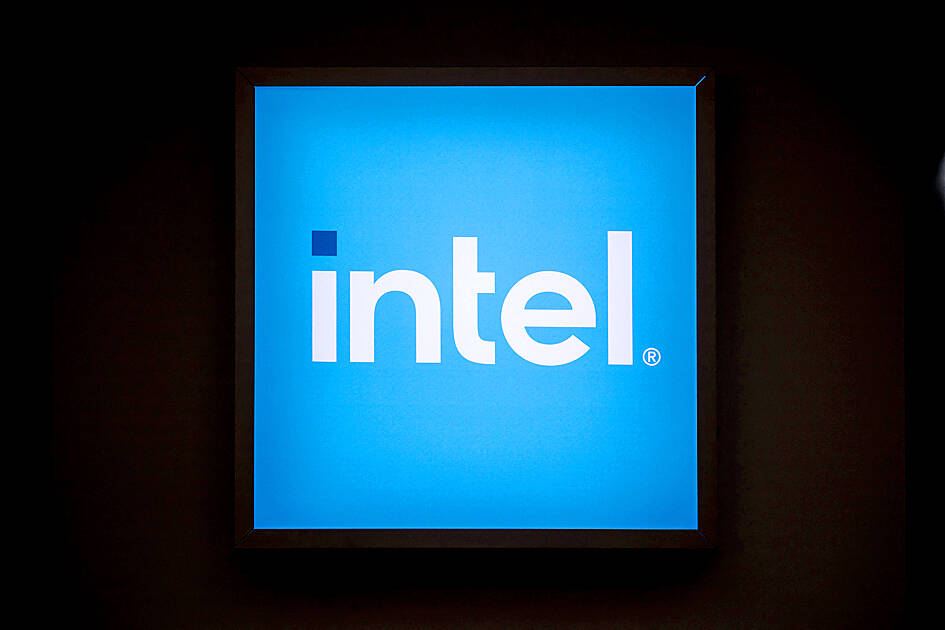US President Joe Biden’s administration is in talks to confer more than US$10 billion in subsidies to Intel Corp, people familiar with the matter said, in what would be the largest award yet under a plan to bring semiconductor manufacturing back to US soil.
Intel’s award package is expected to include both loans and direct grants, the source said. They stressed that negotiations are still under way.
The US Department of Commerce and Intel declined to comment.

Photo: AFP
The incentives would come from the 2022 Creating Helpful Incentives to Produce Semiconductors (CHIPS) and Science Act, which set aside US$39 billion in direct grants as well as loans and loan guarantees worth US$75 billion to get the world’s top semiconductor companies to manufacture chips in the US after decades of production abroad.
Chips firms have invested more than US$230 billion in the US since Biden took office, and the administration’s goal is to establish at least two leading-edge manufacturing clusters by 2030.
Intel dominated the chip industry for years but has recently fallen behind Asian rivals Taiwan Semiconductor Manufacturing Co (台積電) and Samsung Electronics Co, which are building their own US sites in Arizona and Texas. Intel chief executive officer Pat Gelsinger has been the leading industry voice lobbying for US government support of the sector, and the firm has said its plans are contingent on that funding.
Intel is building a US$20 billion facility in Ohio, undergoing a US$20 billion expansion in Arizona and investing US$3.5 billion in New Mexico.
It is not yet clear how Intel’s award would be split between grants and loans, the source said.
Loan terms are company-specific, the source said, as are benchmarks that the Commerce Department would impose to disburse the funding over time.
Intel, based in Santa Clara, California, has not said when its projects would begin commercial production.
The company has made significant progress in Ohio, a spokesperson said after the Wall Street Journal reported a delay from next year to 2026.
An administration official said that the timeline is in bounds with Intel’s initial projections and based on market factors, not award announcements.

Intel Corp chief executive officer Lip-Bu Tan (陳立武) is expected to meet with Taiwanese suppliers next month in conjunction with the opening of the Computex Taipei trade show, supply chain sources said on Monday. The visit, the first for Tan to Taiwan since assuming his new post last month, would be aimed at enhancing Intel’s ties with suppliers in Taiwan as he attempts to help turn around the struggling US chipmaker, the sources said. Tan is to hold a banquet to celebrate Intel’s 40-year presence in Taiwan before Computex opens on May 20 and invite dozens of Taiwanese suppliers to exchange views

Application-specific integrated circuit designer Faraday Technology Corp (智原) yesterday said that although revenue this quarter would decline 30 percent from last quarter, it retained its full-year forecast of revenue growth of 100 percent. The company attributed the quarterly drop to a slowdown in customers’ production of chips using Faraday’s advanced packaging technology. The company is still confident about its revenue growth this year, given its strong “design-win” — or the projects it won to help customers design their chips, Faraday president Steve Wang (王國雍) told an online earnings conference. “The design-win this year is better than we expected. We believe we will win

Chizuko Kimura has become the first female sushi chef in the world to win a Michelin star, fulfilling a promise she made to her dying husband to continue his legacy. The 54-year-old Japanese chef regained the Michelin star her late husband, Shunei Kimura, won three years ago for their Sushi Shunei restaurant in Paris. For Shunei Kimura, the star was a dream come true. However, the joy was short-lived. He died from cancer just three months later in June 2022. He was 65. The following year, the restaurant in the heart of Montmartre lost its star rating. Chizuko Kimura insisted that the new star is still down

While China’s leaders use their economic and political might to fight US President Donald Trump’s trade war “to the end,” its army of social media soldiers are embarking on a more humorous campaign online. Trump’s tariff blitz has seen Washington and Beijing impose eye-watering duties on imports from the other, fanning a standoff between the economic superpowers that has sparked global recession fears and sent markets into a tailspin. Trump says his policy is a response to years of being “ripped off” by other countries and aims to bring manufacturing to the US, forcing companies to employ US workers. However, China’s online warriors